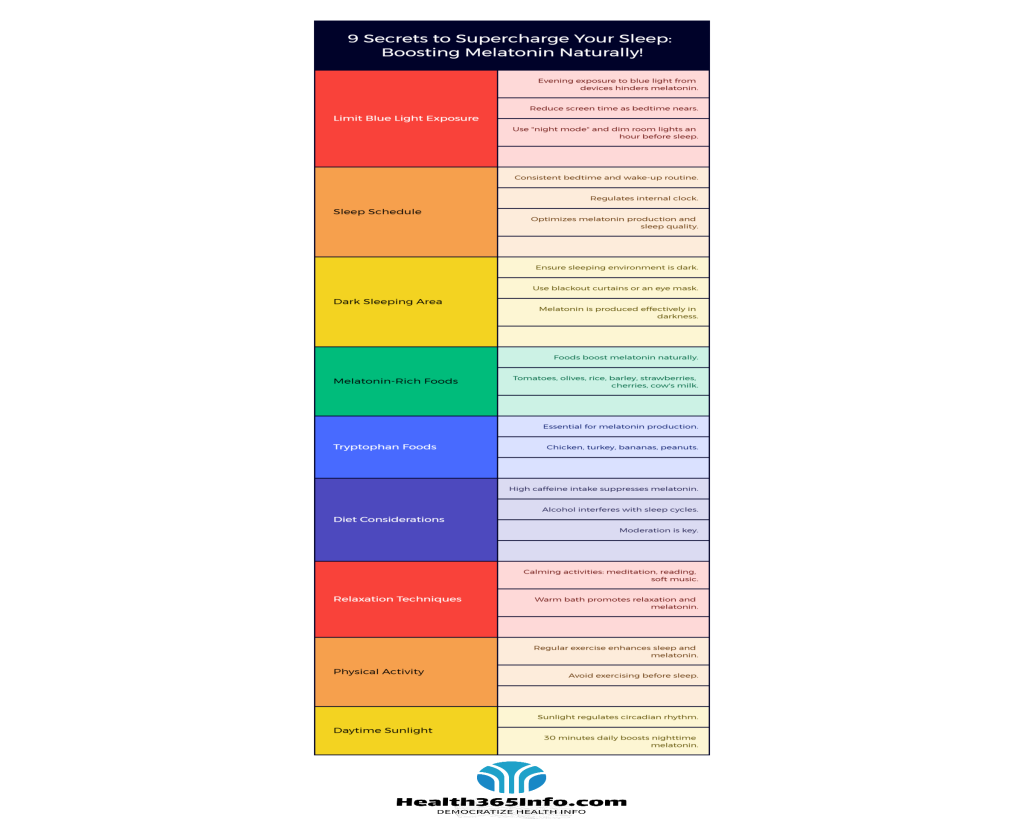
1. Limit Blue Light Exposure in the Evening
When exposed in the evening, the blue light emitted by phones, tablets, computers, and many other electronic gadgets can significantly reduce melatonin production. Reduce your screen time or use “night mode” on your devices in the evening. Additionally, signaling to the body that it is time to sleep and encouraging melatonin production can be achieved by darkening the lights at least an hour before bedtime.
2. Maintain a Regular Sleep Schedule
Your body’s internal clock can be managed and melatonin synthesis can be maximized by maintaining a regular bedtime and wake-up time.
3. Establish a dim sleeping atmosphere
Melatonin is frequently referred to as the “darkness hormone.” When you retire to bed, make sure your bedroom is dark. An eye mask or blackout curtains may be useful.
4. Consume Foods High in Melatonin
Some foods naturally contain melatonin or substances that promote its synthesis. Tomatoes, olives, rice, barley, strawberries, cherries, and cow’s milk are a few of these.
5. Consume Foods High in Tryptophan
Tryptophan is an amino acid that helps create serotonin, which then contributes to the creation of melatonin. Tryptophan-rich foods include chicken, turkey, bananas, and peanuts.
6. Watch What You Eat
A lot of coffee can reduce melatonin production. Additionally, drinking alcohol, especially right before bed, can mess with your sleep-wake cycle.
7. Think About Relaxation Methods
Stress can be reduced and the body can get ready for sleep by partaking in relaxing activities like meditation, reading, or listening to music. Before bed, taking a warm bath can help you unwind and may even increase your body’s synthesis of melatonin.
8. Move about physically
Regular exercise can improve melatonin production and the quality of sleep. But avoid working out too close to bedtime. Regular physical exercise promotes the generation of melatonin and helps to regulate the body’s circadian clock.
9. Spend Time in the Sun During the Day
The natural sleep-wake cycle of your body, known as the circadian rhythm, is greatly influenced by sunlight. Your body is stimulated to make more melatonin at night if you get enough sunlight during the day. Aim for daily sunlight exposure of at least 30 minutes, especially in the morning.

KEY References
Bright light therapy and melatonin in motor restless behaviour in dementia: a placebo-controlled study. (2001, January 1). PubMed. https://doi.org/10.1002/1099-1166(200101)16:1
McClinton, J. (2023, August 15). How to Increase Melatonin Production. Fullscript. https://fullscript.com/blog/how-to-increase-melatonin-production
Suni, E., & Suni, E. (2023, September 8). Melatonin and Sleep. Sleep Foundation. https://www.sleepfoundation.org/melatonin
Yang, J., Du, Y., Shen, H., Shujie, R., Liu, Z., Zheng, D., Shi, Q., Li, Y., & Wei, G. X. (2022, August 18). Mindfulness-Based Movement Intervention to Improve Sleep Quality: A Meta-Analysis and Moderator Analysis of Randomized Clinical Trials. International Journal of Environmental Research and Public Health; Multidisciplinary Digital Publishing Institute. https://doi.org/10.3390/ijerph191610284
Tseng, T. H., Chen, H. C., Wang, L., & Chien, M. Y. (2020, September 15). Effects of exercise training on sleep quality and heart rate variability in middle-aged and older adults with poor sleep quality: a randomized controlled trial. Journal of Clinical Sleep Medicine; American Academy of Sleep Medicine. https://doi.org/10.5664/jcsm.8560
Rusch, H. L., Del Rosario, M., Levison, L. M., Olivera, A., Livingston, W. S., Wu, T., & Gill, J. (2018, December 21). The effect of mindfulness meditation on sleep quality: a systematic review and meta‐analysis of randomized controlled trials. Annals of the New York Academy of Sciences; Wiley-Blackwell. https://doi.org/10.1111/nyas.13996
Meng, X., Li, Y., Li, S., Zhou, Y., Gan, R. Y., Xu, D. P., & Li, H. B. (2017, April 7). Dietary Sources and Bioactivities of Melatonin. Nutrients; Multidisciplinary Digital Publishing Institute. https://doi.org/10.3390/nu9040367
Meng, X., Li, Y., Li, S., Zhou, Y., Gan, R. Y., Xu, D. P., & Li, H. B. (2017, April 7). Dietary Sources and Bioactivities of Melatonin. Nutrients; Multidisciplinary Digital Publishing Institute. https://doi.org/10.3390/nu9040367
Lack, L., Gradisar, M., Van Someren, E. J., Wright, H., & Lushington, K. (2008, August 1). The relationship between insomnia and body temperatures. Sleep Medicine Reviews; Elsevier BV. https://doi.org/10.1016/j.smrv.2008.02.003
Hasler, B. P., Buysse, D. J., Kupfer, D. J., & Germain, A. (2010, June 1). Phase relationships between core body temperature, melatonin, and sleep are associated with depression severity: Further evidence for circadian misalignment in non-seasonal depression. Psychiatry Research-neuroimaging; Elsevier BV. https://doi.org/10.1016/j.psychres.2010.04.027
Gooley, J. J., Chamberlain, K., Smith, K. A., Khalsa, S. B. S., Rajaratnam, S. M. W., Van Reen, E., Zeitzer, J. M., Czeisler, C. A., & Lockley, S. W. (2011, March 1). Exposure to Room Light before Bedtime Suppresses Melatonin Onset and Shortens Melatonin Duration in Humans. The Journal of Clinical Endocrinology and Metabolism; Endocrine Society. https://doi.org/10.1210/jc.2010-2098













